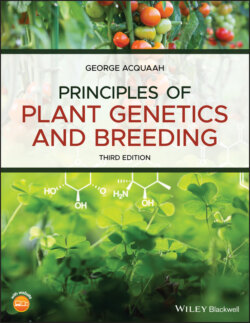Читать книгу Principles of Plant Genetics and Breeding - George Acquaah - Страница 17
1.1 What is plant breeding?
ОглавлениеPlant breeding is a deliberate effort by humans to nudge nature, with respect to the heredity of plants, to an advantage. The changes made in plants are permanent and heritable. The professionals who conduct this task are called plant breeders. This effort at adjusting the status quo is instigated by a desire of humans to improve certain aspects of plants to perform new roles or enhance existing ones. Consequently, the term “plant breeding” is often used synonymously with “plant improvement” in modern society. It needs to be emphasized that the goals of plant breeding are focused and purposeful. Even though the phrase “to breed plants” often connotes the involvement of the sexual process in effecting a desired change, modern plant breeding also includes the manipulation of asexually reproducing plants (plants that do not reproduce through the sexual process). Breeding is hence about manipulating plant attributes, structure, and composition to make them more useful to humans. It should be mentioned at the onset that it is not every plant character or trait that is readily amenable to manipulation by breeders. However, as technology advances, plant breeders are increasingly able to accomplish astonishing plant manipulations – needless to say not without controversy, as is the case involving the development and application of biotechnology to plant genetic manipulation. One of the most controversial of these modern technologies is transgenesis, the technology by which gene transfer is made across natural biological barriers.
Plant breeders specialize in breeding different groups of plants. Some focus on field crops (e.g. soybean, cotton), horticultural food crops (e.g. vegetables), ornamentals (e.g. roses, pine trees), fruit trees (e.g. citrus, apple), forage crops (e.g. alfalfa, grasses), or turf species (e.g. Bluegrass, fescue). More importantly, breeders tend to specialize in or focus on specific species in these groups (e.g. corn breeder, potato breeder). This way, they develop the expertise that enables them to be most effective in improving the species of their choice. The principles and concepts discussed in this book are generally applicable to breeding all plant species.
